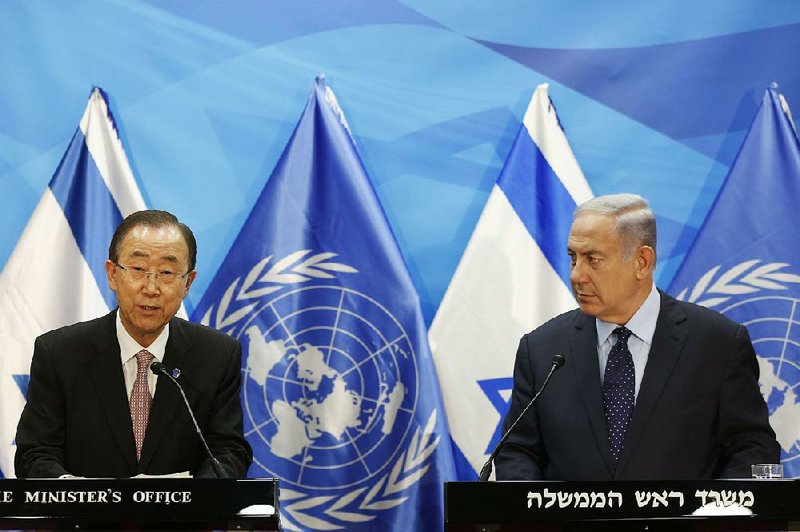GAZA CITY, Gaza Strip -- The United Nations secretary-general on Tuesday criticized Israel's blockade of Gaza, a day after Israel and Turkey reached a broad reconciliation pact that eases, but doesn't eliminate, the isolation of the coastal strip.
In a visit to the region, which included a stop at a Gaza school, Ban Ki-moon said the "closure of Gaza suffocates its people, stifles its economy and impedes reconstruction efforts."
"It's a collective punishment for which there must be accountability," he said.
Ban told Israeli Prime Minister Benjamin Netanyahu that while he understood Israel's security concerns, any measures it took would not "solve the underlying causes of the cycles of violence" that have plagued the region.
Israel and Turkey, meanwhile, worked to formalize their agreement to restore full diplomatic relations after six years of animosity between the once-close allies.
In Ankara, Foreign Ministry Undersecretary Feridun Sinirlioglu signed the deal. In a similar ceremony, Israeli Foreign Ministry Director General Dore Gold signed the pact in Jerusalem. The signings were largely procedural, and the deal still must go through votes in Turkey's parliament and Israel's Cabinet.
The agreement with Israel includes an exchange of ambassadors, and Israel will provide compensation for the deaths of 10 Turkish citizens in a 2010 Israeli naval raid on an activist flotilla that aimed to breach the Gaza blockade.
Turkey will be allowed to take relief supplies into Gaza and carry out new development projects there, but the deal did not fully lift the blockade imposed on the Hamas-ruled territory to prevent the Palestinian militant group from importing arms.
A Turkish ship carrying 10,000 tons of aid for Gaza is scheduled to depart Friday for the Israeli port of Ashdod, according to a spokesman for Turkish President Recep Tayyip Erdogan.
Gaza's Hamas rulers thanked Erdogan for his support in alleviating the area's hardship, but they stopped short of endorsing the pact.
Israel and Egypt imposed the blockade on Gaza in 2007, after Hamas, which has pledged Israel's destruction, seized power.
Relations between Israel and Turkey began to decline after Erdogan, whose party has Islamist roots, became prime minister in 2003. Relations took a sharp turn during Israel's three-week war against Hamas in Gaza -- from late December 2008 to January 2009 -- when Erdogan criticized Israel over the high Palestinian death toll.
Israel said the operation was needed to halt Hamas rocket fire and that the heavy civilian death toll resulted from Hamas using residential areas for cover.
The relations reached their nadir in 2010 when Israeli commandos stormed a Turkish ship aiming to breech the Gaza blockade. Ten Turks, including a dual American citizen, were killed. On the Israeli side, seven soldiers were wounded by activists who attacked them with clubs, knives and pipes.
After the raid, Turkey withdrew its ambassador to Israel and scaled back military and economic ties. Relations were never broken completely.
In Israel, there has been broad criticism of the pact, in part because it did not secure the return of the remains of two Israeli soldiers, and possibly two living Israeli civilians, believed to be held by Hamas.
Three Israeli Cabinet ministers, including the new defense minister, Avigdor Lieberman, have said they will vote against the pact. But Netanyahu is expected to have enough votes to pass the measure in his government.
Kemal Kilicdaroglu, the leader of Turkey's main opposition party, said the deal amounts to Turkish recognition of the Gaza blockade.
"From the moment you signed it, you are making this blockade legal," Kilicdaroglu said. "You are accepting Israel's control over Gaza."
Also on Tuesday, Israeli police banned non-Muslims from a contentious Jerusalem holy site until the end of the Muslim holy month of Ramadan after two days of clashes with Palestinians at the site.
Police spokesman Micky Rosenfeld said rocks and other objects were hurled toward police forces and Jewish worshippers in a nearby plaza. A 73-year-old woman was wounded.
Police arrested 16 people in the disturbances, Rosenfeld said.
As a result, police decided to close access to Jewish worshippers and other visitors for the remainder of the week to prevent tensions with Muslim worshippers.
Since Sunday, Palestinians had holed up in the Al-Aqsa Mosque and attacked officers with fireworks and other objects stockpiled inside.
The mosque is part of a compound sacred to both Muslims and Jews. Muslims refer to it as the Noble Sanctuary, where they believe the Prophet Muhammad embarked on a journey to heaven, while Jews refer to it the Temple Mount. Two biblical Jewish temples stood on the site.
Information for this article was contributed by Suzan Fraser and Aron Heller of The Associated Press.
A Section on 06/29/2016

